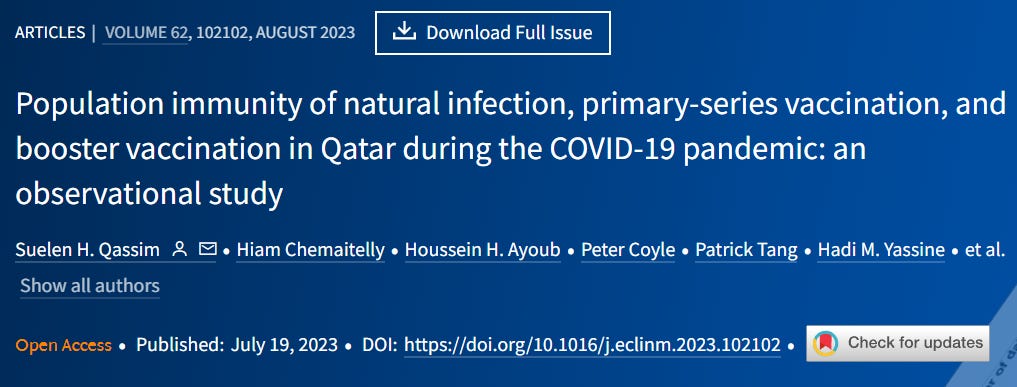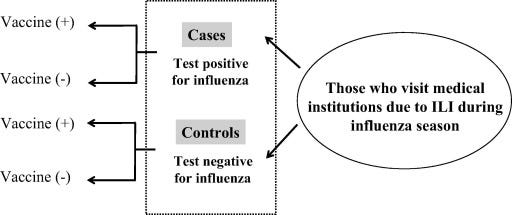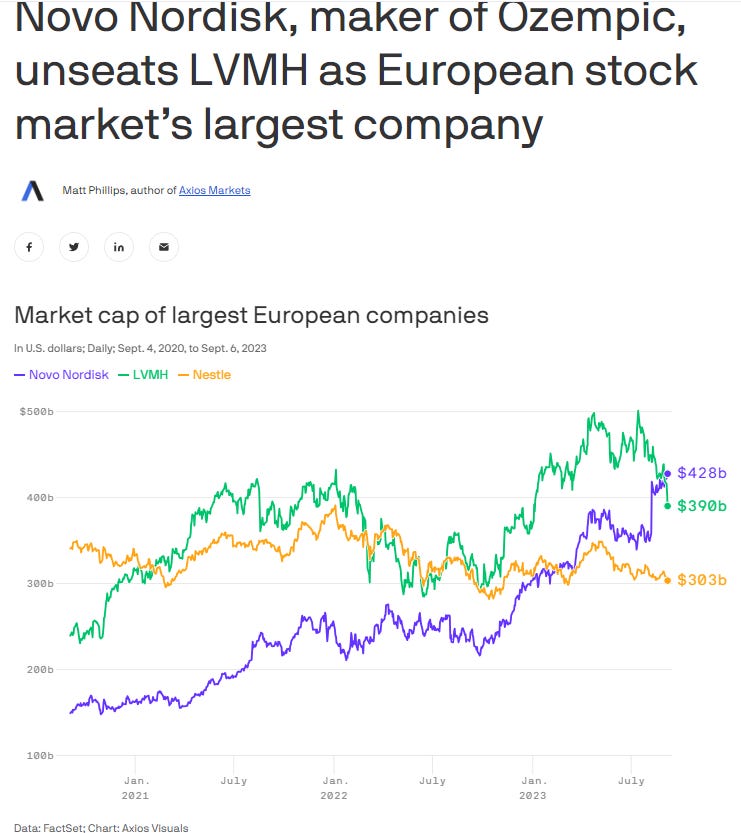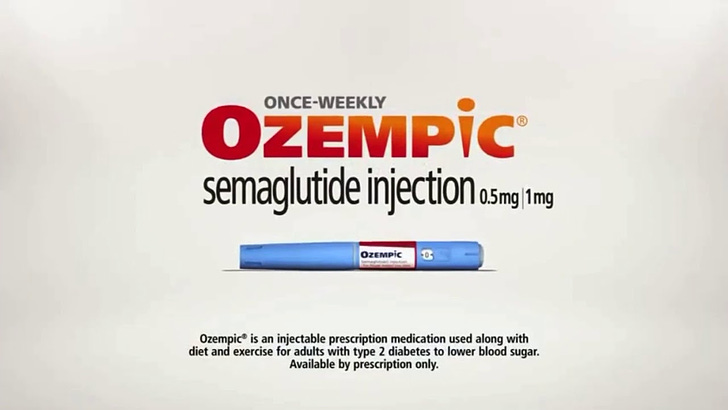We may as well call Ozempic a "miracle drug"...
Is there really nothing that this drug can't do? At least that's what the press is pushing now.
*Cover image sourced from The Federalist with credit provided to a screencap from the Bill Maher interview on Joe Rogan’s YouTube channel.
I was working on a few things the past few days, including assessing this article from The Lancet1 which people have suggested as being an indicator of the COVID vaccines showing “negative efficacy”.
There’s a lot to address about this study, most notably that it’s a test-negative study. In general, a randomized control trial would put people into either an intervention group or a placebo/control group. People from both groups are then followed to see rates of incidences related to the intervention (infection in the case of vaccination), essentially measuring outcomes between groups to see any statistically significant difference between the two.
In a test-negative study design, participants are categorized based upon their outcomes first, and are then examined for variables such as vaccination status, infection history, age, sex, etc.
In the case of a vaccine efficacy study what happens is that someone who happens to test positive during a certain time period would then be categorized as a case while someone who tested negative during at some point is considered a control. From there, the vaccination/infection history of that person is then used to further categorize them.
An outline of this procedure can be seen from Fukushima, W., & Hirota, Y.2 in the case of a test-negative flu vaccine study:
There’s a lot of issues with this methodology, with one of the biggest criticisms being that test-negative studies lack generalizability. There’s also the fact that these types of studies may be inferred to mean something that may not be reflected in the data due to limitations in test-negative methodology.
In short, this study, like the prior studies that have come out of Qatar, suffer from several methodological issues. This doesn’t take into account how testing was conducted, how people were grouped into cases or controls on a monthly basis, and other issues that relate to the design of these studies.
Also, note that the researchers justify their “negative efficacy” results by inferring immune imprinting as an explanation. This is a wrong justification, because the method in which the study was conducted doesn’t infer immune imprinting.
This is an issue of a term being used that doesn’t fit the original definition of what OAS/immune printing was defined as. It’s the same issue we’re seeing with “VAIDS” which both simultaneously does and doesn’t infer parallel pathologies as AIDS depending on who wants to use it in their article.
Remember that immune imprinting infers that future infections would be shaped by prior infections. In the case of vaccines, a proper test of immune imprinting would require a 3-hit rate of exposure to the spike antigen in order to assess immune imprinting.
An example would be receiving two doses of the mRNA vaccine, getting infected with some variant such as Omicron, and then seeing if this person’s immune system would have a directed response towards Wuhan spike only or if there will be a broader, hybrid immune response. The problem is that many immune imprinting studies incorrectly consider the first infection hit as the immune imprinting event to assess, but this is sort of like showing someone a test that they didn’t really study for and complaining that they failed because they were focused on studying the wrong things…
Well, I guess I have rambled on a bit about this study… If anyone wants a breakdown of some of the methodological issues please let me know. Overall, anything that the study concludes has likely occurred through limitations that overall does not reflect in a real-world setting.
But this article isn’t about The Lancet (as far as I am aware of) or COVID, but it’s about Ozempic and Ozempic-like drugs. It seems like every day something new is being reported about this class of drugs, from being associated with addictive behavior to now likely aiding in neurodegenerative disease.
Researchers seem to be considering these drugs as the next frontier in dementia research, as mentioned in this article from CNBC.
And today Novo Nordisk published a press release about their SELECT study examining the long-term use of Wegovy in reducing major acute cardiovascular events, or MACE.
Unfortunately, this press release seems to be a redundant release reiterating the same results that they mentioned a few months prior:
Bagsværd, Denmark, 8 August 2023 – Novo Nordisk today announced the headline results from the SELECT cardiovascular outcomes trial. The double-blinded trial compared subcutaneous once-weekly semaglutide 2.4 mg with placebo as an adjunct to standard of care for prevention of major adverse cardiovascular events (MACEs) over a period of up to five years. The trial enrolled 17,604 adults aged 45 years or older with overweight or obesity and established cardiovascular disease (CVD) with no prior history of diabetes.
The trial achieved its primary objective by demonstrating a statistically significant and superior reduction in MACE of 20% for people treated with semaglutide 2.4 mg compared to placebo1. The primary endpoint of the study was defined as the composite outcome of the first occurrence of MACE defined as cardiovascular death, non-fatal myocardial infarction or non-fatal stroke. All three components of the primary endpoint contributed to the superior MACE reduction demonstrated by semaglutide 2.4 mg. 1,270 first MACEs were accrued.
So we’ll have to keep waiting for the actual study to see if there may be any funny business.
In the meantime, I covered a prior study which seemed to serve as the foundation for this SELECT study which seemed to have its own funny business:
It does seem that at this point the current remarks around Ozemic and Wegovy continue to help Novo Nordisk’s stock, with recent remarks suggesting that Novo Nordisk is now the most valuable company on Europe’s stock market dethroning the seat previously held by LVMH:
It seems like these Ozempic-like drugs are one’s to look out for in the coming months. For me, I’m more focused on seeing how the growing interest in Ozempic-like drugs continue to shape the narrative surrounding obesity.
As I’ve remarked several times pharmaceutical companies rely on public outcry in order to garner financial investments for their products. Push the public to want a drug, no need a drug, and then sell them the drug as a solution for all of their woes and maladies.
Obesity has always been a growing crisis in the US, but it’s always been considered to be a disease of lifestyle made more difficult by the processed foods that are pushed onto us.
Now, with these Ozempic-like drugs, the messaging has shifted. It’s no longer about being in control of your own body, but that weight-loss is now a disease that requires external interventions.
We’re now seeing headlines such as the following from Insider, in which Ozempic-like drugs are now being touted as the solution for obesity’s burden on the healthcare industry:
Again, more emphasis on the fact that people are not in control of their own health and must turn to pharmaceuticals. I won’t be surprised if people come out in the next few weeks suggesting that Ozempic-like drugs are the solution to the obesity epidemic and a new solution in solving a public health crisis…
We’re reaching a point where a supposed “miracle drug” in Ozempic-like drugs is looming on the horizon. The question is whether people will be wise to the bs that they are being fed, or whether they will cave to whatever new fad comes out of the pharmaceutical industry that gets labeled as the thing to save humanity.
With that, I came across a clip from Joe Rogan’s recent interview with Bill Maher where they comment about this change in how obesity is perceived. It’s interesting to see people discuss the craziness associated with these drugs, although I would argue that Bill Maher’s comments on scientists not knowing how Ozempic works isn’t fully founded. The nuance isn’t there yet, but some of the ideas on Ozempic’s mechanism of action is known.
Anyways, just some food for thought. Enjoy you Friday everyone!
Substack is my main source of income and all support helps to support me in my daily life. If you enjoyed this post and other works please consider supporting me through a paid Substack subscription or through my Ko-fi. Any bit helps, and it encourages independent creators and journalists such as myself to provide work outside of the mainstream narrative.

Qassim, S. H., Chemaitelly, H., Ayoub, H. H., Coyle, P., Tang, P., Yassine, H. M., Al Thani, A. A., Al-Khatib, H. A., Hasan, M. R., Al-Kanaani, Z., Al-Kuwari, E., Jeremijenko, A., Kaleeckal, A. H., Latif, A. N., Shaik, R. M., Abdul-Rahim, H. F., Nasrallah, G. K., Al-Kuwari, M. G., Butt, A. A., Al-Romaihi, H. E., … Abu-Raddad, L. J. (2023). Population immunity of natural infection, primary-series vaccination, and booster vaccination in Qatar during the COVID-19 pandemic: an observational study. EClinicalMedicine, 62, 102102. https://doi.org/10.1016/j.eclinm.2023.102102
Fukushima, W., & Hirota, Y. (2017). Basic principles of test-negative design in evaluating influenza vaccine effectiveness. Vaccine, 35(36), 4796–4800. https://doi.org/10.1016/j.vaccine.2017.07.003












This is the culmination of a trend in medicine that existed for decades. Everything becomes a disease and then there's a magic happy pill to make it all better.
I see it as a perverse and subtle violation of basic medical ethics, as it begins by basically lying to the patient, strips away their bodily autonomy through deceit, and ultimately violates the most essential ethical principle of all: "do no harm".
The challenge is rapidly becoming how can we possibly trust a physician, if he or she is willing to participate in such an ethically bankrupt system?
Obesity didn't jump from unhealthy to a disease, in between was a campaign to normalize it. Surely I'm not the only one that remembers all the ads about beauty coming in all sizes. Rogan and Maher did mention fat shaming, that was part of the campaign to normalize it.
I decided to change my life before it was too late. Let me tell you as a former fat person, fat people don't feel beautiful, they subconsciously despise themselves for having no self control. Realizing that I didn't want to spend whatever life I have left living on drugs I made a New Years resolution. I started eating carnivore, after a month and a half I swapped to Keto. I have very little appetite so I'm intermittent fasting because of it. I've lost 51 lbs, I sleep great, I feel great, and I just joined a gym and have sessions with a trainer. I can fit in clothes I last wore in the 1990s, now I want to build muscle and retain bone. I am lazy, and if I can do this anyone can. Just start by cutting grains, potatoes, and sugar. And stay away from seed oils! You will lose weight and gain self-esteem.
Thank you for coming to my Ted Talk.